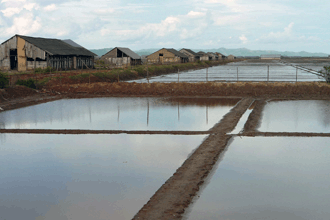 Photo: David Swanson/IRIN Despite significant economic growth in recent years, TB remains a key challenge for Cambodia
Photo: David Swanson/IRIN Despite significant economic growth in recent years, TB remains a key challenge for Cambodia
PHNOM PENH, 7 August 2008 (IRIN) - Tuberculosis, which has been on the rise globally, has generally remained steady in Cambodia since 2003, even declining slightly, but detection rates are low.
According to the Cambodia Ministry of Health's 2007 Tuberculosis Report, the number of patients who die after treatment is extremely low, at 3 percent, while the number cured remains high, at 90 percent.
The target cure rate for the World Health Organization (WHO) is 85 percent.
In 2007, the total number of reported TB cases in 2007 was 36,495, up by about 1,000 reported cases from the year before. Cambodia had an incidence rate of 500 per 100,000 people in 2007, unchanged from 2006.
"The situation is definitely getting better," Jamhoih Tansing, a WHO tuberculosis physician, told IRIN. "But case detection rates remain low and Cambodia's TB burden is quite high."
According to a report by Family Health International (FHI), 13,000 Cambodians die annually of tuberculosis out of a population of about 14 million.
Drug-resistant tuberculosis, or MDR-TB, a deadlier strain of the bacterium, has been on the rise slightly in Cambodia, but is not the pressing issue as in Africa and South America, said Song Ngak, deputy country director for FHI.
The main challenge now, she said, was accurate data as current TB numbers rely heavily on estimates. "I would venture to question the validity of the estimates," she said.
"We still need to conduct door-to-door surveys and pin down a closer number to the actual case detection rate."
 Photo: Geoffrey Cain/IRIN A TB patient receives treatment at Cambodia's National Centre for Tuberculosis and Leprosy Control
Photo: Geoffrey Cain/IRIN A TB patient receives treatment at Cambodia's National Centre for Tuberculosis and Leprosy Control
In addition to the challenges in detecting the disease, Tansing cited poor prison conditions, poverty, and lack of a regular system of TB screening for HIV patients as all contributing to TB.
Over half of HIV-positive patients in Cambodia will become infected with TB in their lives. However, HIV is becoming less prevalent, down to 0.8 percent of the population in 2008 from 3.1 percent in 2003, according to the Joint United Nations Programme on HIV/AIDS (UNAIDS). "
The HIV component of TB is definitely declining," Ngak said. "But there's still not much decline in the TB incidence rate."
In 2007, the number of TB patients who were HIV-positive in Cambodia declined to 7.8 percent, a sharp fall from a 2003 high of 11.8 percent. But the number of TB cases without HIV has remained steady.
Detecting TB through community action
To more efficiently treat and control the spread of TB, the WHO has implemented a treatment strategy called DOTS (directly observed treatment, short-course), emphasising community-based disease detection over reporting by individuals, as well as directly observing a patient's medication intake for six to eight months.
"The problem was that patients were not taking their TB treatment, so they would get sicker," said Ngak. "Now, we can ensure patients are taking their treatment through the local community, with local doctors watching them."
The strategy also emphasises providing better quality treatment centres, enhancing healthcare legislation to fight TB, and creating better systems of supplying drugs to patients.
"Some groups, like in prisons, are not even receiving correct treatment for TB," Ngak said.
"DOTS will better procure the correct drugs to them." But despite these efforts, challenges remain. 
Photo: Geoffrey Cain/IRIN
In the overcrowded slums of Phnom Penh, TB can breed easily
According to specialists, community-based TB detection still does not catch carriers of the disease who show no symptoms. Nearly 60 percent of Cambodians carry the bacterium in their lungs, but have not actually succumbed to TB.
In many cases, carriers could take 10 years or more to show noticeable symptoms, such as excessive coughing, weakness and chills. In the meantime, they can easily spread the disease.
Yet for Chun Ratana, 53, who has TB symptoms from living in cramped conditions in a Phnom Penh slum, community-based detection and treatment still have not arrived.
"I don't know where to get free treatment, because I can't afford drugs," she said.
"No NGO has ever spoken to me about being sick, and when I ask them, they say they can't help."
A free tuberculosis treatment centre is situated near her house, but she fears being hospitalised because she could lose too many months of work.













